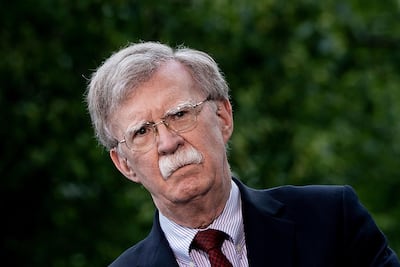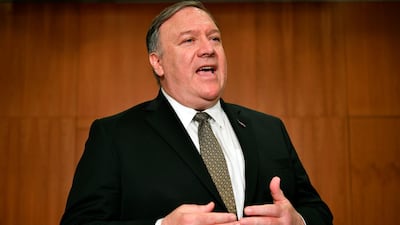The Donald Trump administration has sent a carrier strike group and a bomber task force to the Middle East in response to what its top defence official called a "credible threat" from Iranian forces.
The announcement late on Sunday came amid rising tension in the region after tighter US sanctions on Iran and Iranian threats to block the vital oil shipping lane through the Strait of Hormuz.
On Monday, US Acting Defence Secretary Patrick Shanahan said the move was "in response to indications of a credible threat by Iranian regime forces".
"We call on the Iranian regime to cease all provocation. We will hold the Iranian regime accountable for any attack on US forces or our interests," Mr Shanahan tweeted.
Announcing the move as a warning to Iran on Sunday, National Security Adviser John Bolton said the US was sending "the USS Abraham Lincoln Carrier Strike Group and a bomber task force to the US Central Command region to send a clear and unmistakable message to the Iranian regime that any attack on United States interests or on those of our allies will be met with unrelenting force".
Mr Bolton said the US was not seeking war with Tehran but was fully prepared to respond to any attack, "whether by proxy, the Islamic Revolutionary Guard Corps, or regular Iranian forces”.

Last September, Mr Bolton warned Tehran against targeting US interests or personnel in Iraq, after an attack at the US consulate in Basra.
Washington's forces "have been ordered to the region as a deterrence to what has been seen as potential preparations by Iranian forces and its proxies that may indicate possible attacks on US forces in the region", an American official told Reuters.
It is unclear where the exact destination of the carrier is but Central Command’s area encompasses the Middle East, Egypt and Central Asia, including Afghanistan and Iraq.
US Secretary of State Mike Pompeo, on his way to Europe, said the actions undertaken by the US had been in the works for some time.
"It is absolutely the case that we have seen escalatory actions from the Iranians and it is equally the case that we will hold the Iranians accountable for attacks on American interests," Mr Pompeo said.
"If these actions take place, if they do by some third-party proxy, a militia group, Hezbollah, we will hold the Iranian leadership directly accountable for that.
"I don't want to talk about what underlays it but make no mistake, we have good reason to want to communicate clearly about how the Iranians should understand we will respond to actions they may take."
After the US decision to designate the Iranian Revolutionary Guard Corps as a foreign terrorist organisation and end waivers for countries importing oil from Iran last month, the Guard threatened to block shipping and increased military manoeuvres in the area.
Iranian proxies in Iraq have also increased their threats against US troop presence in the region.
Tehran was likely to introduce "reciprocal measures" against the US for its withdrawal from the nuclear deal, an Iranian news agency said on Monday.
Under the deal, signed with world powers in 2015, Iran agreed to halt its nuclear programme in exchange for lifting sanctions imposed against it.
President Hassan Rouhani was likely to announce "step-by-step plans" on the one-year anniversary of the US pullout from the deal on May 8, news agency Isna reported.
Mr Trump pulled Washington from the multilateral deal known as the Joint Comprehensive Plan of Action over Iran's continued development of its ballistic missile programme and support for terrorist groups in the region.
Iran's response would include the "partial and complete reduction of some of Iran's commitments and restarting part of nuclear activities halted" after the deal was struck, Isna reported.
The report said the measures would be in line with two sections of the accord, which open the way for Iran to cease some or all of its commitments under the deal if the US or other parties fail to adhere to it, including by reimposing sanctions.
"This will be Iran's first step towards reacting to the US withdrawal from the JCPOA and also European countries' failure to live up to their commitments," Isna reported.
EU officials "who have just made unfulfilled promises during the last year" had been unofficially informed of the decision, the agency said.
The three European parties to the deal – Britain, France and Germany – announced the establishment of a special payments system called Instex in late January to bypass renewed US sanctions.
But the trade mechanism was dismissed by Iran's supreme leader Ayatollah Ali Khamenei as a "bitter joke" and that the difference between EU obligations and their proposals was "as far as the Earth is from the sky".

